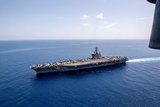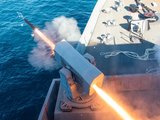Will Singapore inject Sea Venom?
Singapore has expressed interest in a lightweight shore-based anti-ship missile system, with industry sources attending IMDEX and the Shangri-La Dialogue confirming that the island’s military was considering MBDA’s new high subsonic Sea Venom anti-ship missile.
The missile is now undergoing testing and is expected to enter service in 2020, according to an MBDA source. When contacted, Singapore’s Ministry of Defence said, ‘We have nothing to say about it.’
The Sea Venom is a medium-range anti-ship missile developed for shipborne helicopters of the French and UK navies and will replace MBDA’s older air-launched Sea Skua anti-ship missile on UK naval helicopters.
Already have an account? Log in
Want to keep reading this article?
More from Naval Warfare
-
![Raytheon will develop an advanced naval sensing and targeting system for DARPA]()
Raytheon will develop an advanced naval sensing and targeting system for DARPA
RTX’s solution for DARPA’s Pulling Guard programme is intended to provide advanced maritime defence technologies to protect platforms against uncrewed surface vehicles and other threats.
-
![Spain’s F100 upgrade mirrors Aegis modernisation paths in allied navies]()
Spain’s F100 upgrade mirrors Aegis modernisation paths in allied navies
The Spanish Navy’s Alvaro de Bazan-class of air defence frigates will receive the latest Aegis Weapon System technology among other modernisations to extend the service life to 2045.
-
![UK’s Fleet Solid Support ship programme deemed on track despite steel supply concerns]()
UK’s Fleet Solid Support ship programme deemed on track despite steel supply concerns
Shipbuilders are saying the programme is going ahead on time as the government estimates 7.7 million tonnes of steel are needed for 2026 infrastructure projects.
-
![Raytheon unveils details of its proposal for the US Navy/NATO ESSM Next Significant Variant]()
Raytheon unveils details of its proposal for the US Navy/NATO ESSM Next Significant Variant
In an exclusive interview with Shephard, Raytheon’s VP of Shipboard Missiles disclosed what improvements the company plans to offer for the Sea Sparrow NSV.






















